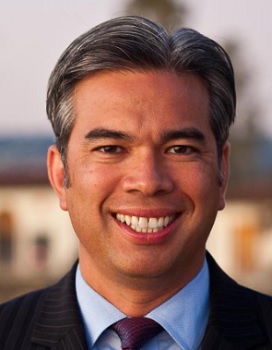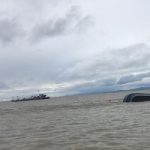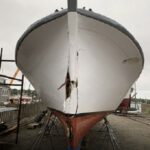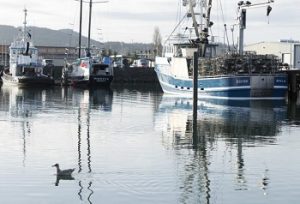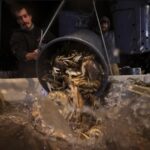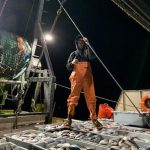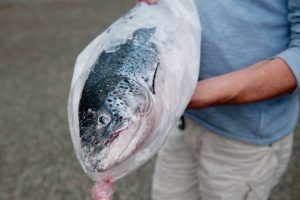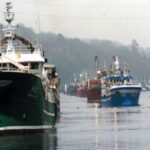Tag Archives: crab fishery
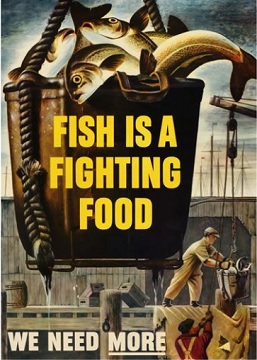
A Correction, and an Apology
Good afternoon. We posted a submitted article called Enough is Enough, regarding the crab fishery in 3ps. We were not aware that this person was not genuine. It appears it is a fake account, which is extremely disturbing. We have a bad habit. If a fisherman wants to submit material, we do our best to accommodate them. However, to get hosed doing it is unacceptable. To the fisherman that reached out to us, and bringing this to our attention, we apologize to you, and thank you. The post has been removed. Fisherynation.com 16:45
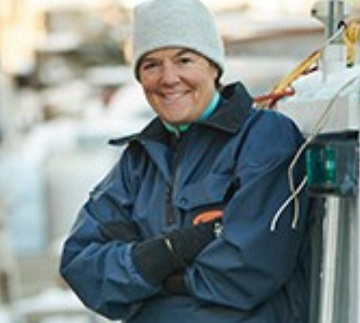
Deadliest Catch’s newest star: A Q&A with Maine’s Linda Greenlaw
The newest season of Deadliest Catch will feature a Maine connection, with popular fisherman, author and reality TV star Linda Greenlaw joining the cast. Q: You’re known to most Mainers and wider audiences as a fisherman of swordfish and lobster. Did you find transitioning to crab fishing difficult for “Deadliest Catch?” A: Transitioning to the crab fishery was not too difficult for me – I have been involved in the offshore red cred fishery here in New England and have been fishing fixed gear on and off since I was a kid. The difference was primarily hauling single, massive pots as opposed to trawls of smaller traps. Finding crab was the biggest challenge. This was my first experience with Bairdi crab and also my first trip on the Bering Sea. >click to read< 16:21
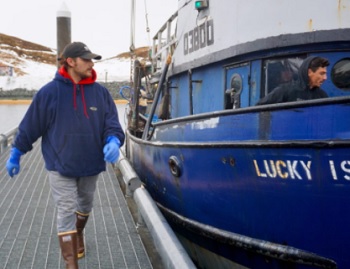
Coronavirus closes a third Aleutian plant, stranding Bering Sea fishermen at the dock
In the Aleutian port town of Unalaska, at least five local boats are stuck at the dock with nowhere to deliver their cod after the shutdown of the Alyeska Seafoods processing plant, according to a crew member on one of them, Tacho Camacho Castillo. Alyeska closed its plant Friday “based on a cluster of positive cases” identified through “surveillance testing,” the City of Unalaska said in a prepared statement. “There’s two days and this fish starts to spoil,” Camacho Castillo, a crew member on the 58-foot Lucky Island, said in an interview Friday. “Am I going to be throwing out fish into the ocean? It’s going break my heart, for real, if I throw all this fish away.” >click to read< 18:38
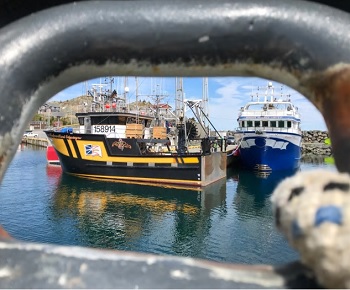
Coronavirus: FFAW calling for delay of crab fishery, NL-FHSA released 12 control measures to prevent spread of virus on fishing vessels
The FFAW’s crab committee chairs met Sunday and voted to delay the fishery opening again. President Keith Sullivan said the recommendation will be sent to the Department of Fisheries and Oceans, who holds the authority to open or delay the fishery. “We have to be able to ensure that we have a safe fishery for everyone involved,” Still, Sullivan said harvesters aren’t ready to call off the 2020 crab fishing season, which employs thousands and is worth more than $300 million, including export value and spin offs.,, Meanwhile, The Fish Harvesting Safety Association (NL-FHSA) has released 12 control measures to prevent the spread of COVID-19 on fishing vessels, if fisheries open later this spring. >click to read< 18:14
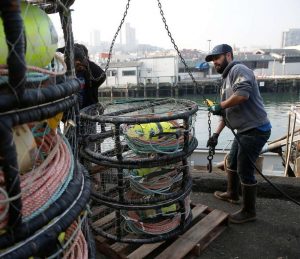
California seeks plan to protect whales and Dungeness crab fishery
Whales are a big deal, literally, as the most majestic, largest animals swimming off our shore. What the California Department of Fish and Wildlife has done in the past several years with our partners to prevent whale entanglements in fishing gear is a big deal, too.,, That is why our department is taking actions to protect the whales and our prized crab fishery. The department is working to create a conservation plan that will analyze the effects of crab fishing on whales, identify steps to minimize the risk of whale entanglements in the crab fishing gear, secure funding to implement the plan, and submit it to the federal government for needed approval. >click to read<12:14
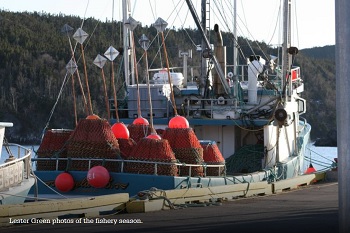
Winds stymie crab fishery on east coast of province
Since the arrival of Europeans on the shores of Newfoundland, harvesting of the fisheries has been heavily controlled by one major factor, Mother Nature. Winds, tides, and ice conditions determines when and where harvesting of the resource occurs. Modern day fisheries are no exception. Last year harvesting of snow crab was hampered by the arrival of ice on the northeast coast. For several weeks the ice packed into the various crooks and crannies that dot our bays and inlets keeping crab boats secured to the wharves. Harvesting was delayed as the ice drifted to and from the coastline. Photo’s >click to read<
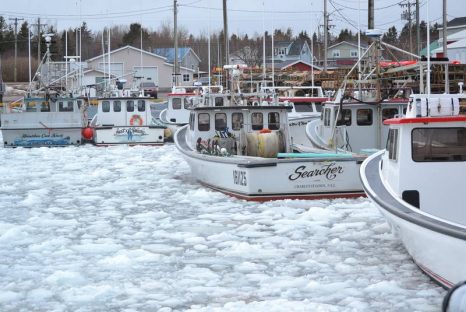
Ice still holding up crab fishery
The Canadian Coast Guard still has about five to seven days of ice-breaking operations around New Brunswick’s Acadian Peninsula, the acting superintendent of Ice Operations Atlantic, Trevor Hodgson, reported Wednesday. Ice had started its normal regression from the Gulf of St. Lawrence by early March but a few days of northeasterly winds in mid-March reversed that trend. “It hit the Gulf pretty hard, he said. “It essentially took all the ice that was in the Gulf and compacted it into three big piles,”,, >click to read<20:49
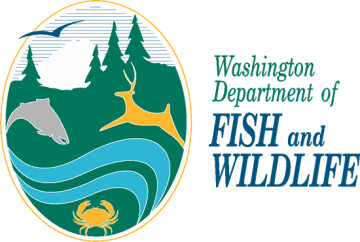
WDFW delays commercial crab fishery on Washington coast due to low meat content
State shellfish managers have delayed the opening of the commercial Dungeness crab fishery on Washington’s coast due to inadequate meat in crab shells. Recent testing indicates crabs along the coast do not have sufficient meat in their shells to meet industry standards for harvest. The fishery will be delayed until at least Dec. 16 to allow more time for crabs to fill with more meat. Contrary to an erroneous news report, WDFW did not delay the commercial crab fishery due to a harmful algae bloom click here to read the story 17:53
Responses to fishing crises differ, Bob Borck, FV Belle J II
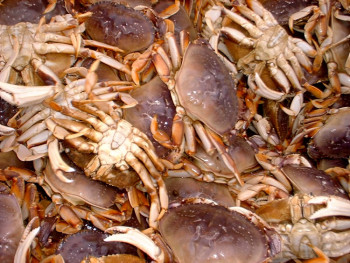 For some coastal residents, commercial fishing is in our blood. It’s how we support our families — producing healthful local food. Fishing is part of our economy and heritage. Today, California’s fishing communities face two crises. The first is the unprecedented closure of the crab fishery. We may or may not be able to fish for crab this season, depending on when our crab pass state tests. In the meantime, fishing families are suffering. The second crisis is the state of our salmon fisheries. The drought and the Bureau of Reclamation’s mismanagement of the Sacramento River, the backbone of California’s , have been disastrous for spawning salmon. Read the op-ed here 07:59
For some coastal residents, commercial fishing is in our blood. It’s how we support our families — producing healthful local food. Fishing is part of our economy and heritage. Today, California’s fishing communities face two crises. The first is the unprecedented closure of the crab fishery. We may or may not be able to fish for crab this season, depending on when our crab pass state tests. In the meantime, fishing families are suffering. The second crisis is the state of our salmon fisheries. The drought and the Bureau of Reclamation’s mismanagement of the Sacramento River, the backbone of California’s , have been disastrous for spawning salmon. Read the op-ed here 07:59






